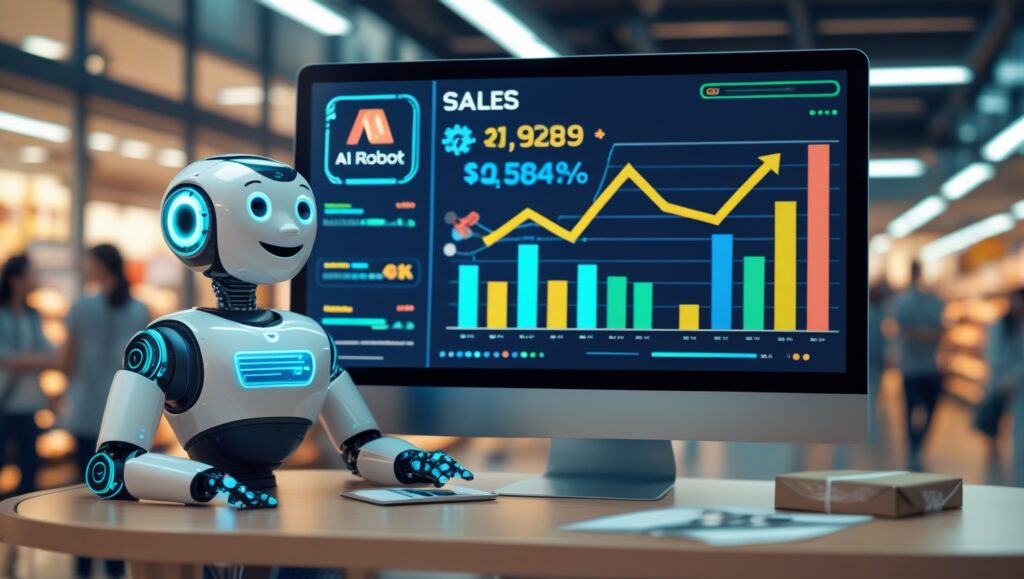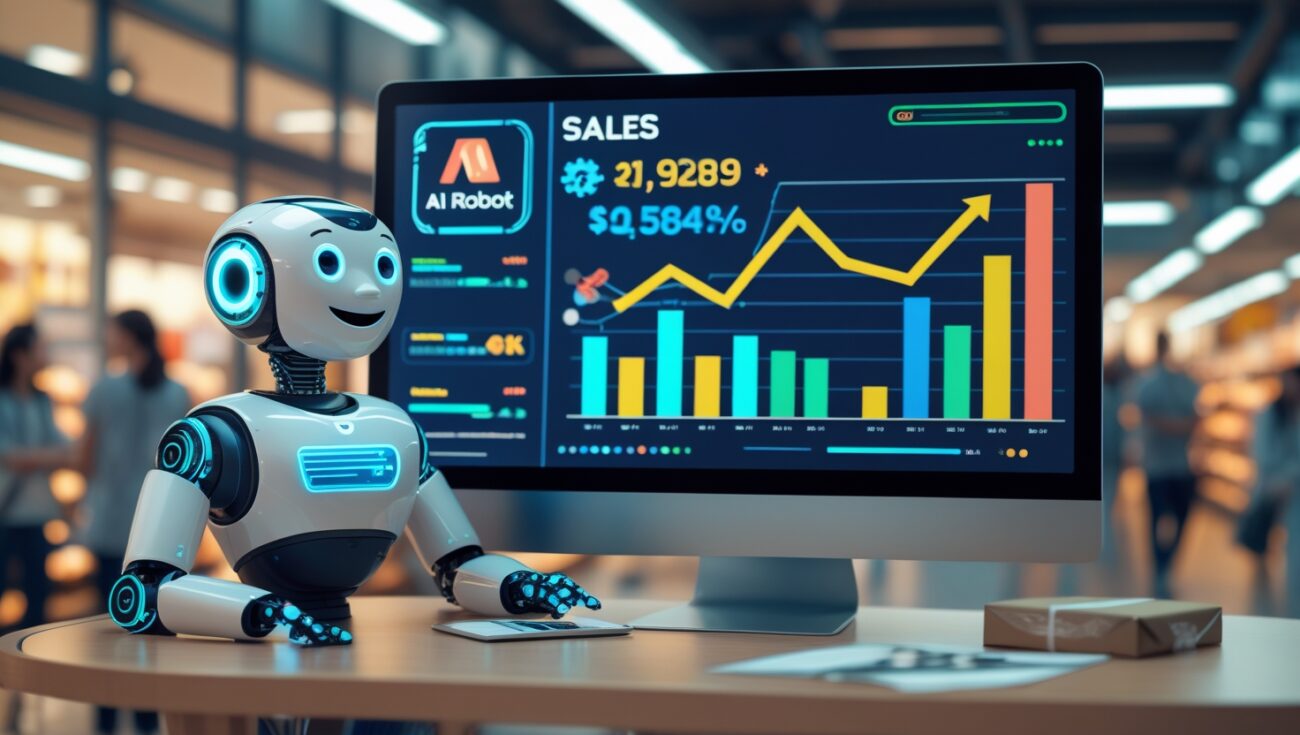How AI Can Increase Sales in Your E-commerce Store
Artificial Intelligence (AI) is no longer just a buzzword — it’s a powerful tool that’s transforming the way e-commerce businesses attract, convert, and retain customers. Whether you’re running a small Shopify store or managing a large online marketplace, AI can help you optimize your sales strategy, boost conversions, and deliver better customer experiences.
If you want to take your content strategy to the next level with AI-powered tools, I recommend checking out Frase here. It’s one of the best AI platforms for content optimization and growth.

Table of Contents
1. Personalized Product Recommendations
One of the biggest drivers of e-commerce sales is personalization. AI analyzes customer data — browsing history, purchases, and preferences — to suggest products that match their interests. Just like Amazon’s famous “Customers who bought this also bought” feature, you can leverage AI to create personalized shopping experiences that increase your average order value.
2. AI-Powered Chatbots for Better Customer Service
Modern shoppers expect 24/7 customer support. AI-driven chatbots can handle FAQs, recommend products, process returns, and even upsell items. This not only saves you time and staffing costs but also ensures customers always receive quick, accurate responses.
3. Smarter Email Marketing Campaigns
Email marketing still drives a huge chunk of e-commerce revenue. With AI, you can segment your audience more effectively and send personalized product emails at the right time. For example, AI can detect when a customer is likely to churn and send them a discount code before they leave.
4. Dynamic Pricing Optimization
Pricing can make or break a sale. AI helps online stores adjust prices in real time based on demand, competitor pricing, and customer behavior. This ensures you stay competitive while maximizing profits.
5. AI for Visual Search
Instead of typing keywords, customers can upload an image and find similar products in your store. AI-powered visual search makes the shopping experience easier and reduces friction for buyers who don’t know how to describe what they want.
6. Inventory and Supply Chain Management
AI predicts demand patterns and helps you manage inventory efficiently. No more overstocking or losing customers because items are out of stock. With predictive analytics, you can align your inventory with seasonal demand and customer behavior.
7. Voice Commerce is Growing
With Alexa, Siri, and Google Assistant becoming mainstream, voice-based shopping is on the rise. AI ensures your products are optimized for voice search queries, making your store accessible in this growing sales channel.
8. AI-Enhanced Customer Insights
AI collects and processes vast amounts of customer data to uncover hidden patterns. This helps you understand what products perform best, which marketing campaigns convert, and what customers really want — allowing you to refine your strategy for maximum ROI.
9. Predictive Upselling and Cross-Selling
AI algorithms can predict what a customer is likely to buy next and offer timely upsell or cross-sell opportunities. Instead of generic product suggestions, AI delivers smart recommendations that boost sales without annoying your customers.
10. Fraud Detection and Security
Fraud is a serious issue in e-commerce. AI can detect unusual transaction patterns, prevent chargebacks, and keep your store safe from fraudulent activity. This builds customer trust and protects your revenue.
11. AI for Content Creation and SEO
Your e-commerce store needs high-quality content to rank on Google and attract organic traffic. AI tools like Frase help you research keywords, create SEO-friendly content, and optimize product descriptions so your store stands out in search results.
12. Personalized Discounts and Promotions
Instead of sending generic discounts, AI tailors promotions to each customer based on their buying history and likelihood to purchase. This increases conversion rates and prevents unnecessary margin loss.
Final Thoughts
AI is revolutionizing e-commerce by making it smarter, faster, and more customer-centric. From chatbots and personalization to SEO and fraud detection, AI tools can help your online store grow revenue and reduce costs.
AI can analyze customer behavior in real-time, helping me anticipate needs and tailor the shopping experience. This means customers feel understood, which naturally increases conversion rates.
I use AI to optimize product descriptions. By analyzing search queries and top-ranking pages, AI helps me write descriptions that not only rank on Google but also encourage buyers to make a purchase.
Dynamic pricing powered by AI ensures I stay competitive. It automatically adjusts prices based on demand, seasonality, and competitor activity, which helps maximize revenue without constant manual monitoring.
Predictive analytics allow me to identify trends before they peak. This helps me stock the right products at the right time, avoiding overstock or missed sales opportunities.
AI-powered email marketing takes the guesswork out of campaigns. By segmenting audiences and predicting the best send times, I see higher open and click-through rates, turning casual visitors into loyal customers.
I’ve noticed that personalized product recommendations increase average order value. AI identifies complementary products that customers are likely to purchase together, making upselling seamless and natural.
AI chatbots don’t just answer questions—they engage users with personalized product suggestions and follow-ups, improving customer satisfaction while freeing up my time.
Visual search is another game-changer. By allowing users to upload photos to find similar items, AI reduces friction and helps customers discover products they might not have found otherwise.
AI can also identify customer pain points through sentiment analysis. By understanding complaints or frustrations, I can quickly adjust product offerings, marketing messages, and customer support strategies.
Content creation for e-commerce can be tedious, but AI tools like Frase help me generate SEO-friendly product descriptions, blog posts, and category pages that drive organic traffic.
Integrating AI in my marketing funnels ensures smarter ad targeting and retargeting, reaching customers who are more likely to convert while reducing wasted ad spend.
Finally, AI allows me to experiment quickly. From testing promotions to trying new product layouts, AI provides insights on what works best, helping me scale strategies that actually generate sales and revenue.

